Birmingham pub bombings: Why has no-one been brought to justice?
- Published

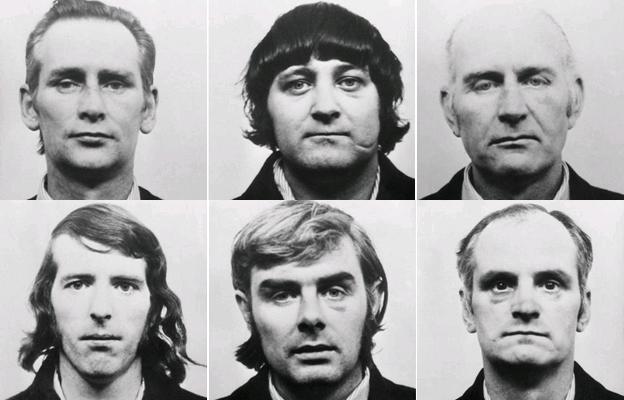
Paddy Hill, Gerry Hunter, Johnny Walker, Hugh Callaghan, Richard McIlkenny and Billy Power were wrongly convicted of the 1974 Birmingham pub bombings
Forty years ago 21 people were killed when bombs were detonated at the Mulberry Bush and the Tavern in the Town pubs in Birmingham city centre. Six men were wrongly convicted for the bombings in 1975 and were finally released in 1991.
Since then, no-one has been found responsible. No-one has been prosecuted. No-one has been arrested. And no-one has admitted it.
Why?

Is there enough evidence?

Chris Mullin, a former MP and an investigative journalist who was instrumental in freeing the group who became known as the Birmingham Six, said of those he believes were behind the bombings: "Forty years after the event, other than a confession, there is no evidence that would stand up in court which would lead to the conviction of the surviving suspects".
Mr Mullin became a researcher for ITV's World in Action in 1985 and several editions were dedicated to discrediting the evidence on which the Birmingham Six had been convicted.
In 1986, Mr Mullin published a book, Error of Judgement: The Truth About the Birmingham Bombings, in which he claimed to have traced and met some of those actually responsible.
Evidence was lost
After a review was carried out, external between 2012 and 2014, it was announced in April that, of the original 168 exhibits listed for trial in 1975, there were 35 which the reinvestigation team was unable to locate, including a bomb which did not go off.
The current Chief Constable for the West Midlands, Chris Sims, said the force assumed the items had been disposed of in the 1980s "on the basis the case had been completed".
"That feels utterly at odds with current procedure but was probably not unusual at that time," he said.
A spokesman for the Association of Chief Police Officers said the "general rule of thumb" for retaining evidence was seven years.
"It isn't cut-and-dried or a one size fits all. Evidence may be retained if it is felt it could be relevant to future investigations."
He said decisions would lie with senior investigating officers or other high-ranking police.
Professor Michael Zander, Professor Emeritus of Law at London School of Economics, explained the significance of an exhibit may not always be apparent to investigating officers.
According to the provisions of the Criminal Procedure and Investigations Act 1996, he said, the prosecution is obliged to pass on any unused material that may assist the defence.
However, "things can get overlooked because they don't know exactly what the defence case is," he said.
"So there are situations when a completely honest policeman could say 'I didn't hand that over because it didn't occur to me that the defence might want to raise that'."
No new evidence
Following the release of the Birmingham Six in 1991, a reinvestigation was opened, led by the then Chief Constable for the West Midlands, Ron Hadfield, and the Director of Public Prosecutions (DPP), Barbara Mills.
A team of 40 officers generated 5,000 documents, statements and reports.
At its conclusion in April 1994, Mr Hadfield and Mrs Mills issued a statement announcing:
•There was insufficient evidence for proceedings against any person
•The inquiries carried out were to the satisfaction of the DPP
•The DPP was unable to suggest any further reasonable lines of inquiry that could have been "usefully pursued" at that time
Julie Hambleton, whose sister Maxine was killed in the bombing, said: "Isn't it the job of the police to go out and find new evidence?
"They just seem to be waiting for it to drop on their desks".
Evidence is unavailable
Mrs Mills, who became a Dame in 1997 and died in 2011, put a 75-year embargo on files relating to a Devon and Cornwall inquiry into the West Midlands Police investigation.
It prevented the release of documents until 2069.
Records can be retained, external for such a length of time "if the disclosure of which would not be in the public interest in that it would harm defence, international relations, national security (including the maintenance of law and order) or the economic interests of the UK and its dependent territories".
They can also be retained if they relate personal details about people who are still alive. Disclosure of such information might be a "breach of confidence" or cause "distress" or "endangerment".

Is there 'something to hide'?

Julie Hambleton said: "Our question is this. Why is this file being kept closed for so long, if the police and the government have nothing to hide?
"Would it not be financially and judicially more prudent to make these files available to all concerned parties as a way of expediting justice?
"Or is this too simple? Do these files have the potential to open up a Pandora's box that could put certain individuals and organisations in a light that they would prefer not to have switched on?"
Following the reinvestigation in 1994, Mr Hadfield said: "The objective [had been] an open minded search for the truth behind the Birmingham pub bombings."
Mr Sims said earlier this year: "Nothing would give me more satisfaction than to bring those responsible for this atrocity to justice.
"However, I make this pledge today - I would like to offer families of those who died or people who were hurt on the night to be given as much information as possible to answer the questions that we can. I would ask them to contact us so we can start that process."
In April 2014, Mr Sims reassured the victims' families that the investigation remained open.
"It is always possible that brand new and significant information could become available to us - let me be clear - this case is not closed," he said.

Has too much time passed?

Independent advice from the Netherlands Forensic Institute was given to the 2012-2014 inquiry that "whilst acknowledging improvements in forensic science, it is assessed that any results from further forensic testing would be unlikely to yield any information of value due to potential contamination, the effects of previous examination and degradation over time".
Chris Mullin has also said that several of the perpetrators, who would now be in their 70s, are dead and would therefore never be brought to justice.

Who are the suspects?

The World in Action programme in 1985 named four suspects the production was "100% sure" were the true perpetrators, and said they knew the identity of a fifth.
After the six were released in 1991, and following the allegations made by World in Action, Mr Hadfield said "all those named as potentially being responsible or involved in the Birmingham pub bombings were thoroughly investigated".
Former BBC Northern Ireland correspondent Denis Murray said Mr Mullin, who claims he knows the names of the perpetrators, is a journalist "to the toenails" and "a journalist will never reveal his sources".
Could Chris Mullin be compelled to give evidence?
A 1986 debate in the House of Commons indicated he could not because:
•Any names would be hearsay and therefore inadmissible in court
•The safety of Mr Mullin would be compromised if he breached any confidentiality agreements
•Mr Mullin's investigation was in the public interest and future journalists could be put off legitimate investigations if they could be compelled to identify suspects
•The investigation was to prove the innocence of the convicted men, not to identify the guilty men

Will there be an inquest?
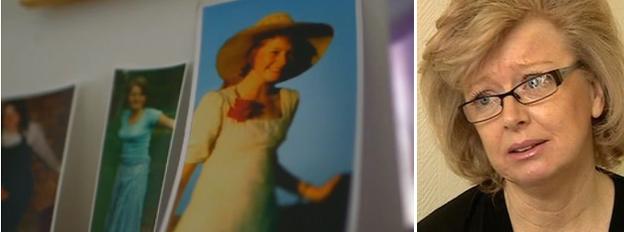
Maxine Hambleton (l) died in the bombing. Her sister Julie (r) has been campaigning for an inquest to be opened
If a person has been sent for trial for causing a death, any inquest is adjourned until the criminal trial is over.
When the trial is over, the coroner can decide there may be no need for an inquest, external, if he or she is satisfied the facts surrounding the death have emerged at the trial.
Because the bombings were subject to a criminal prosecution resulting in a conviction, there was no inquest.
It meant there was no further investigation into the circumstances of the deaths.
Earlier this month, human rights lawyer Kevin Winters, who has represented families of victims of the Troubles in Northern Ireland, said he believed there was a basis for an inquest and would write to West Midlands Police and the relevant coroner.
"There's an on-going duty on behalf of the authorities, and especially West Midlands Police, to actually get to the bottom of what happened.
"These families have received a very poor service in terms of justice and truth and closure - they've got nothing near it at all."

Does the Belfast Agreement have an impact?
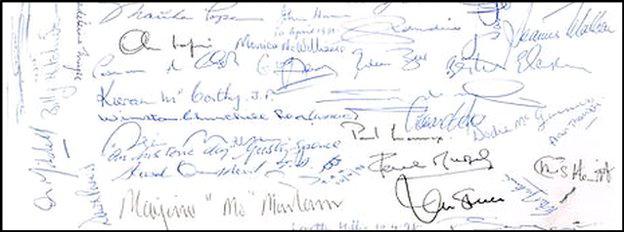
The agreement proposal was signed by Tony Blair, John Hume, Mo Mowlam and Gerry Adams
BBC correspondent Murray has said one of the reasons there has been no prosecution is because of the Belfast Agreement, external - known as the Good Friday agreement.
The agreement specifies that anyone convicted of a paramilitary offence before 1998 would be subject to a maximum of two years in prison, "and probably not even that, if they are prosecuted at all", said Murray.
No-one has been legitimately convicted of the Birmingham pub bombings.
"The people who did this have never admitted it. The agreement doesn't apply to them," Julie Hambleton said.
"It's the largest unsolved mass murder in Britain. I don't understand why [the police] don't want to solve it".
However, Murray has said: "The only people who know for certain who did it are the provisional IRA and they are never ever going to say."
- Published21 November 2014
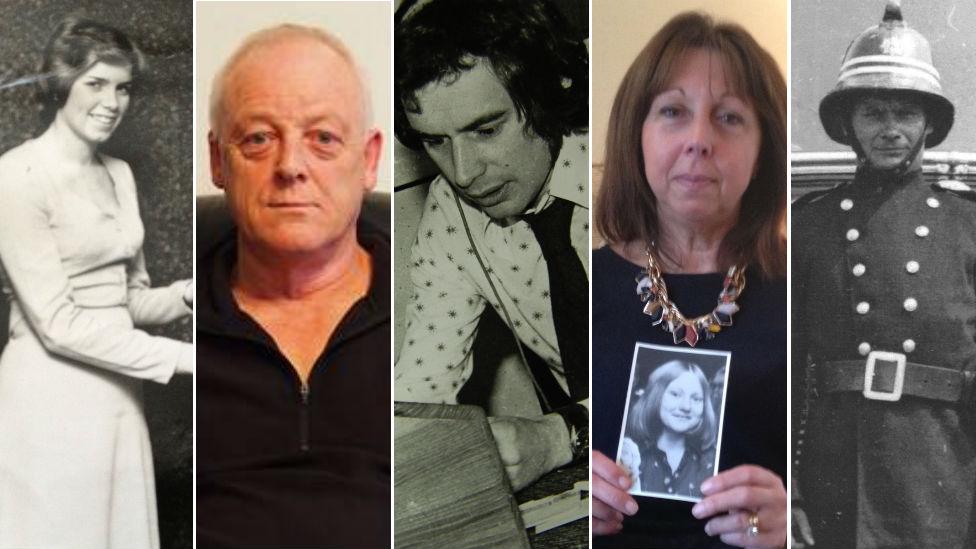
- Published14 November 2014
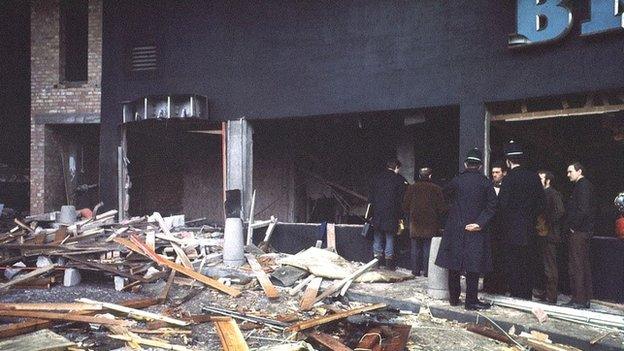
- Published7 April 2014

- Published11 May 2013
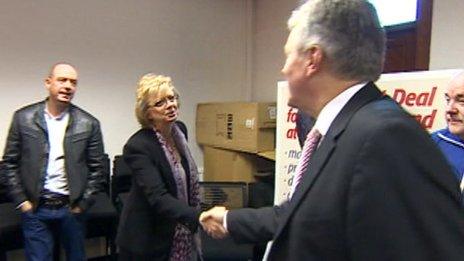
- Published14 March 2011